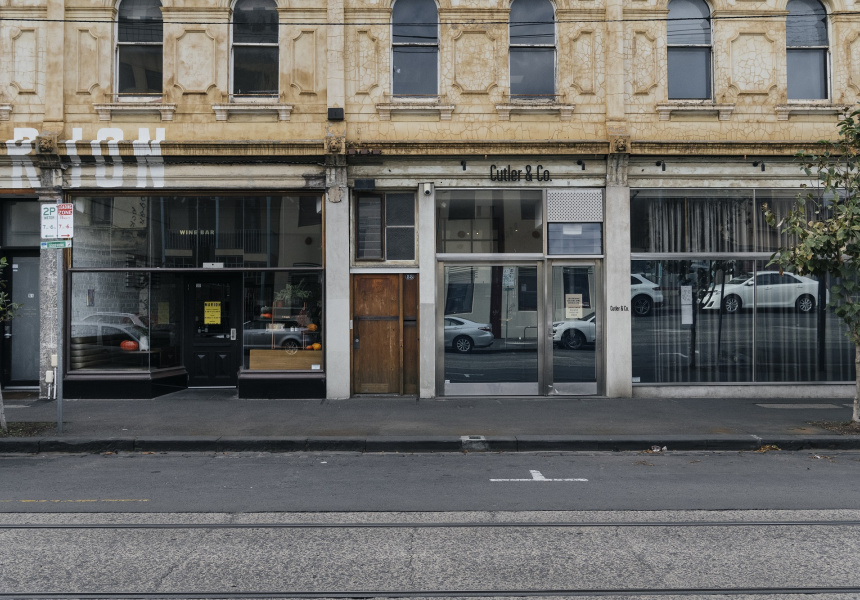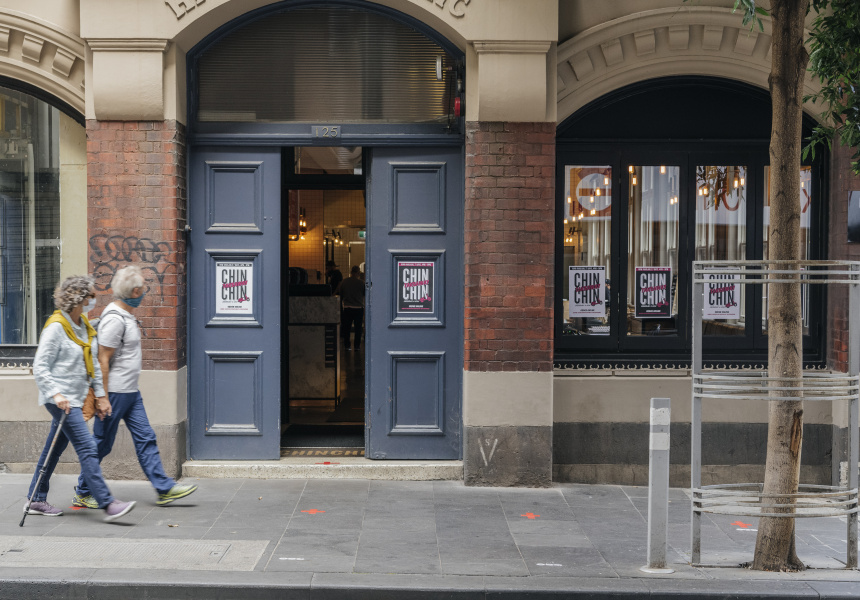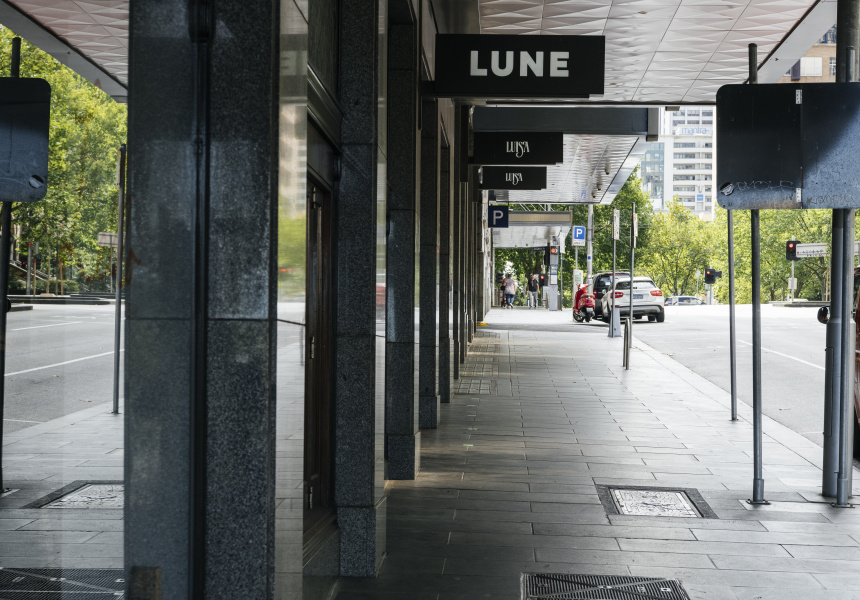Over the past fortnight the Victorian and federal governments have announced numerous stimulus packages to help industries hit hardest by coronavirus, including hospitality. Together, these packages total $320 billion, or 16 per cent of Australia’s total GDP in 2019.
On paper, this enormous figure seems like just the sort of supersized lifebelt needed to haul Melbourne’s restaurants, cafes and bars (and their staff) back from the brink and keep them going for six more months, the time frame Prime Minister Scott Morrison has suggested the country will be locked down. But this sort of financial aid is only as good as the rules governing how it’s distributed. And therein lies the challenge.
“There are so many variables with each business and everyone’s situation is different. There’s no one-size-fits-all sort of thing,” says Sam Peasnell, co-owner of Dexter, Takeaway Pizza, Peaches and Cheek.
We think you might like Access. For $12 a month, join our membership program to stay in the know.
SIGN UPPeasnell is one of several prominent Melbourne restaurateurs we interviewed last week to understand how helpful these packages actually are. We’ll hear more from them in a moment. First, let’s recap what the government has announced so far.
State stimulus package
• March 21 – $1.7 billion, including $550 million worth of payroll tax refunds to 24,000 small and medium-sized businesses with a payroll of less than $3 million. The Victorian government says this will save eligible businesses an average of $23,000 a year, and up to $113,975. Another $500 million is allocated to grants and hardship payments. March liquor licence fees (a few hundred dollars for most businesses) have also been waived.
Federal stimulus packages
• March 12 – Stage one stimulus. $17.6 billion, including one-off $750 payments to current welfare recipients and one-off payments of between $2000 and $25,000 to small and medium-sized businesses.
• March 19 – the Reserve Bank of Australia extends $90 billion worth of credit to banks, to help them keep lending to small and medium-sized businesses.
• March 22 – Stage two stimulus. $66 billion, including another one-off $750 payment to current welfare recipients and an extra $550 per fortnight to all new and existing Jobseeker recipients. The one-off employer payments from stage one are increased to a minimum of $10,000 and a maximum of $50,000, to be applied as a credit on business activity statements (BAS) from April 28. Small and medium-sized businesses can also apply for new bank loans, with 50 per cent of the value guaranteed by the government.
• March 30 – Stage three stimulus. $130 billion, including a new Jobkeeper scheme, where employers receive $1500 per fortnight per employee to continue paying them, for up to six months.
• April 7 – Under a new, mandatory code of practice for commercial tenancies, landlords are now compelled to reduce rent in proportion to how much their tenant’s revenue has declined.
Each one of these stimulus packages has brought some hope to the industry’s despairing ranks, but none more so than the Jobkeeper scheme. It should, in theory, allow businesses to retain and support valued employees, while at the same time reducing wages, one of the largest overheads. But Jobkeeper isn’t yet written into law and won’t be until at least today, April 8. As of now, no restaurant in Australia has received a cent in Jobkeeper payments (or even been approved to receive payments) and won’t until the first week of May. The scheme is a reimbursement – restaurants pay wages for a month, then receive a backdated subsidy at the start of the next month.
“Our main focus is our staff. They’re not getting enough, fast enough,” says Kate Bartholomew, co-owner of CBD restaurants Tonka and Coda. “Staff are calling saying, ‘My boyfriend’s on Jobkeeper here and here and here’. But they haven’t even written the legislation for it yet. It’s just so new and there are so many holes in it, and now everyone thinks we’re the arseholes because we’re not handing on any money.”
Peasnell and his business partners, who employ 65 people, are in a similar situation. “We want everyone to be okay – to be able to put food on the table and pay rent,” he says. “We’re spending so much time on the phone to accountants and having meetings between us to wade through what it all means and what the expectations are. And it seems like the yard post gets changed every week. There are so many staff out there with anxiety about what’s going to happen next, and we can’t provide the information quick enough, in a way.”
“They’ve done an incredible job offering all this stuff, it’s excellent,” says Adele Arkell, owner of St Kilda’s popular Radio Mexico and co-owner of Carlton’s A Cafe Called John. “However, between my two businesses there are about 30 people. Only four of them qualify. They’ve only had days to develop this legislation, which is so detailed. I don’t know how they’re doing it. Hats off to the politicians, but there are lots of things that fall through the cracks.”
Many of Arkell’s staff don’t qualify because they’re here on temporary working visas. Some have been in the country for up to eight years, but they’ll get nothing under the current Jobkeeper arrangement. “There’s no fairness in saying, ‘I can’t get something for you, therefore you’re stood down, I’ve got to favour the Aussie,’” Arkell says.
Chris Lucas (Chin Chin, Kong, Baby and Kisumé) is also keen to see working visa holders included.
“I’m positive about the fact that the government has recognised, clearly, that a wage subsidy is required,” he says. “The one area I’ve got a significant amount of concern about is, the government is still yet to include working visa holders. At the moment there’s quite a humanitarian crisis. I believe, based on media reports, there are more than 1.1 million working visa holders in Australia. Of course, most of them can’t return to their country of origin. They’re stuck here, so I think we’re obliged to look after them.”
To qualify for Jobkeeper, small and medium-sized businesses must demonstrate their revenue has dipped by at least 30 per cent compared to this time last year. In addition to confirming this, the Australian Tax Office (ATO) has been tasked with verifying the eligibility of each individual employee (there are a few other criteria, besides citizenship or holding a particular visa). Say a restaurant believes a staff member is eligible, and continues paying their wage for the next few weeks, only to find out the ATO disagrees with their assessment. The restaurant would be left several thousand dollars out of pocket. The more staff, the greater the risk.
Even an organisation as big and professional as Lucas Restaurants is treading with extreme care here. “It’s challenging for us because we’re a large organisation with more than 1000 employees,” Lucas says. “We’ve basically got to go through each one, person by person. It’s taking us quite a bit of time.
Prime Minister Scott Morrison says 500,000 businesses have already registered for Jobkeeper with the ATO. A source familiar with the scheme tells Broadsheet another 500,000 are likely to join the queue, meaning the ATO will have to work through one million applications between now and the first week of May, when the first payments are due to be made. Even with the help of single-touch payroll, it’s unlikely the ATO can process this many applications so quickly. The first reimbursements will probably be staggered from May, so many restaurants will have to survive for longer than they might expect without support.
“No one’s got any money,” Bartholomew says. “Any help we need, it’s urgent. Now. We can’t wait to be reimbursed. Because by that time, we’ll all be under.”
Other stimulus packages, such as the Reserve Bank’s $90 billion credit line, are designed to address this cash-flow issue. Combined with the government’s 50 per cent guarantee on new loans (stage two, March 22), the idea is to give small and medium-sized businesses immediate access to cash, to be repaid at a later date. The thing is, most restaurants, cafes and bars already carry significant debt during their first five years or so, paying off the initial cost of their fit-out, furniture and equipment. It’s a significant risk to pile more debt onto that.
Two of Peasnell’s four businesses, Peaches and Cheek, are located up a flight of stairs in front of a clearway on Swanston Street. They’ve shut temporarily, as it’s impossible to flip them into viable takeaway operations. In the meantime, the businesses are continuing to pay rent (albeit less than usual), insurance and other fixed costs.
“For us to dip into more debt at this point with no guarantees of when it’s going to end or what the market’s going to look like on the back end … regardless of whether it’s super low-interest or backed [some other way], the idea of borrowing more money at the moment feels crazy,” Peasnell says.
This bring us to the Victorian government’s payroll tax refund, and the federal government’s one-off payment (also a refund) announced in the second stimulus package. Combined, these payments can give businesses a quick boost of between $33,000 and $163,975, depending how large they are. This may sound like a lot, but for a business with 10 employees, $33,000 isn’t enough to make payroll for a single month. And like the Jobkeeper subsidy, it involves a certain amount of paperwork, with clear information hard to come by.
“The state payroll tax refund is great, if you’re compliant,” Bartholomew says. “But we’re finding having two restaurants is very hard.” Though the two venues are run as separate businesses legally, they have a centralised payroll system, meaning they’re being treated as one in this instance.
With 100 employees on the books, Coda and Tonka do not come in under the $3 million eligibility cap. Regardless, she says the refund would only be “a bandaid, a bridge, to get us two weeks away” given the restaurants’ large overheads, including more than $400,000 in combined annual rent.
Likewise, Arkelle estimates that alone, the payroll tax refund will keep Radio Mexico going for “another couple of weeks” while it continues to pay its almost 20 staff.
“Let’s face it, payroll tax is the stupidest tax that’s ever been invented anyway,” she says. “It shouldn’t even exist. Every business owner would agree with me – it’s totally out of step with being able to employ people.” (Last financial year the Victorian government collected $7 billion in payroll tax, making it the state’s most lucrative tax by a wide margin.)
“Any assistance I get, I’m sticking my hand up for it, but it’s going to be very hard for the country to recover from giving it out,” Arkell says. “We all have to share the burden, because the stimulus will likely result in massive inflation in years to come – which we also need to avoid. No matter what’s on offer, with its strengths and shortcomings, it’s never going to match being a trading, functional restaurant, materially or emotionally.”



